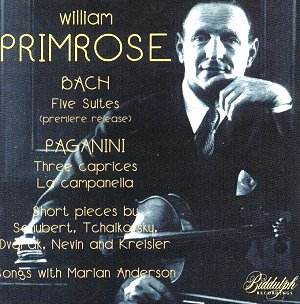This well filled double cannily brings us Primrose’s
famous first viola discs and the last, previously unpublished
arrangements of the Bach Cello Suites made when the violist was
nearing seventy five and had been long since retired. The long
gap between the two and the intervening ailments that beset Primrose
are rather dramatically highlit but it’s of profound documentary
value to have made his perception of the Bach works available
and for this we should be grateful.
The earliest discs here, from 1934-35 find Primrose
still the violist of the world-travelling London String Quartet
and shortly before he became co-principal viola of Toscanini’s
NBC Orchestra. They’ve long since entered folklore and Biddulph’s
transfers compare well with the competition on Pearl. Coupled
with them are the Sidonie Goossens accompanied sweetmeats and
the opportunity to hear his plangent middle register in the Tchaikovsky.
The Vernon de Tar organ accompanied sides date from October 1945,
with the Glaswegian now firmly settled in America. They’re not
rare but they are slightly awkward to collect and haven’t much
been reissued so it’s good that they’re here, even if this first
disc does prove rather a peculiar piece of programming. Admirers
can, even in this lighter fare, still have cause to admire the
exceptional range of colours Primrose can extract from the noble
seriousness of Komm, süsser Tod.
There is also the exemplary balance of the Marian
Anderson sides – four of them – that were recorded back in 1941.
The highlights are the Brahms of course, superbly eloquent; the
Massenet is not properly enunciated and the Rachmaninov is rather
generically sung. If you want soupy orchestration Charles O’Connell
is your man; he piles glucose upon glucose in the Dvořák
and Nevin and Primrose does his best. As David Dalton’s notes
relate it was something of a heroic effort for Primrose to have
recorded the five Bach suites (he balked at No. 6, in D major,
finding it unsuited to the viola). He had suffered a progressively
debilitating hearing loss and this made playing in tune exceptionally
difficult so during the sessions Dalton would correct Primrose’s
score with ascending or descending arrows to demonstrate where
the violist had played out of tune. Primrose recorded the Bach
at Brigham Young University where he was a distinguished teacher
for many years – additionally he’d sold his Guarneri and played
a modern Japanese violin. There are still remarkable things about
his playing; its agility and technical strength and fluidity –
try the Courante of the First Suite for example or the Allemande
of the Fifth, in C minor. Equally the nobility and grandeur he
brought to the Sarabande of the D minor is a distillation of many
years’ profound study and absorption of these works. He can reveal
a rich introspection – as in the Sarabande of the C minor – or
the drive in the Bourées of the E flat. But equally it
can hardly be argued that this is still the tonal and technical
marvel of the earlier years. The tone has withered, the intonation,
despite his and Dalton’s valiant efforts, is frequently approximate
and what one preserves from listening to it is the sense of a
carapace of a great performance, the idealised perfection that
Primrose could have produced say thirty years before.
Given this caveat and the miscellaneous nature
of the rest of the disc this is more a collector’s or a specialist’s
release than one for the general listener. But production values
are high and much here is currently unavailable.
Jonathan Woolf

